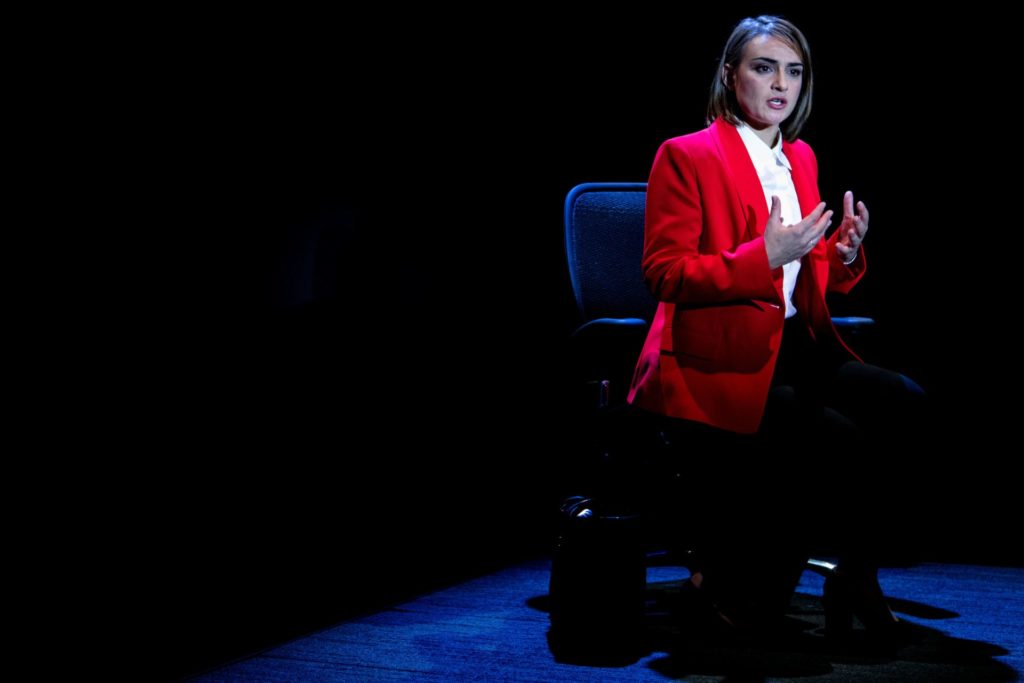You’ve probably seen the posters around the city. A woman with a dignified expression on her face. Her hair is salon-straight and shoulder-length. She’s wearing a red blazer, something Hilary Clintoneque. She is seated at a table, as if about to take the 6 o’clock news anchor.
Her fingers are closed in front of her. She has a slight smirk about her lips, but her eyes are hiding something dark — pain, trauma, unprocessed grief.
What is her story?
In Suzie Miller’s one-woman play, Prima Facie, Tessa Ensler is our heroine —a powerful woman dressed for success. She is one of the city’s top criminal defence barristers, and she knows how to play the game. The game of law, that is.
“We’re officers of the court, we play by the rules,” she boasts. “We’re just storytellers, playing our roles. We never judge.”
She hasn’t lost a case in months. She confident and brusque and brazen and unapologetic. She must be. It’s part of her job. She defends men who have been accused of sexual assault, often because of the optics.

In the beginning of this 100 minute play, we see her espouse her clever strategies — cross examining witnesses and accusers, trying to poke holes in their stories. That’s all she has to do — to win, she must simply cast some reasonable doubt on the jurors.
Did the men do the crimes they were accused of?
She doesn’t care. It’s not her job to care about whether he did it or not. It’s her job to tell her client’s side of the story. And if he’s pleading not guilty, he is not guilty, in this version of the story she must convince the courtroom.
Courtroom dramas are a huge genre in film — less so in theatre. The psychological extremities can easily be transferred to the live stage — especially when it is done well.
Miller, who wrote the play after decades working as a criminal defence lawyer, weaves the script in a “THEN” and “NOW” switch — we get the backstory of Tessa’s career — her first day at law school, her insecurities of not being from an elite private school.
Now, in a top tier chambers, she is surrounded by men in Italian suits and women in silk shirts.
Sheridan Harbridge, who plays our heroine, exudes the poised, fierce-postured barristers we see on our screens and striding along Macquarie Street in Sydney.
Her brisk intelligence earns her the respect of her male colleagues — the kind of respect afforded to women who play by the rules’ laid out by men. She’s compliant — and knows how to twist a victim’s truth on the witness stand to disintegrate their story.
Until that all falls apart.
The solider becomes the victim and everything she once stood for is utterly annihilated. A romance with a fellow barrister leads to an unspeakable crime — now, it’s her word against the man’s.
But all is not equal in law. The man is a top barrister, the son of a QC. He’s from the typical pedigree of ‘private school boys’ — ie. has a lot of resources, support, wealth.
And he knows what’s a stake.
“Don’t you know this will destroy my career?” he lashes out at Tessa when he is arrested.
We know all too well that in this world, a man’s career is deemed more important that a woman’s humanity. Brock Turner. Nicholas Drummond. Men in court sympathising with other men.
Miller’s script is tight, tense and vigorous. Each word is executed with the glowing virtuosity of an actress with a full spectrum of emotions. Harbridge does forceful so well. She also knows how to depict the harrowing dismay of living as a sexual assault survivor.
“I will not cry,” she repeats to herself, over and over.

She knows she needs to perform the character of a dignified woman — even though her dignity has been stripped from her — first, by the male perpetrator, then by the court system.
“The legal system is shaped by the male experience: its cases decided by generations of male judges, its laws legislated by generations of white male politicians, and built against a backdrop where women were categorised once as the property of their husbands, brothers, fathers,” Miller writes in the latest program notes.
“So sexual assault law does not fit the lived experience of women. While innocence/guilt focuses on whether the (usually) male person reasonably believes there was consent or not provided by the (usually) female person, it has always been the victims, (usually) women, who are on trial, cross-examined and made to relive their humiliating experience.”
Throughout the play, I felt my throat clog with anger, my eyes watery with tears. Around the world, one in three women have been subjected to physical or sexual violence in their lifetimes. If you are a woman, how can you not feel the sorrow and grief Tessa Engler feels?
This was one of the most chilling, affecting plays I have ever seen — it agitated something great and powerful inside me — and it’s something every woman should experience.
Content Warning
Prima Facie contains descriptions of sex scenes and sexual assault.
NSW Rape Crisis
1800 424 017 (24/7)
Sexual Assault Counselling Australia
1800 211 028
(8am – 11pm, Mon – Fri)sexualassaultcounselling.org.au
Prima Facie plays at the Seymour Centre until 11 December. Book tickets here.


